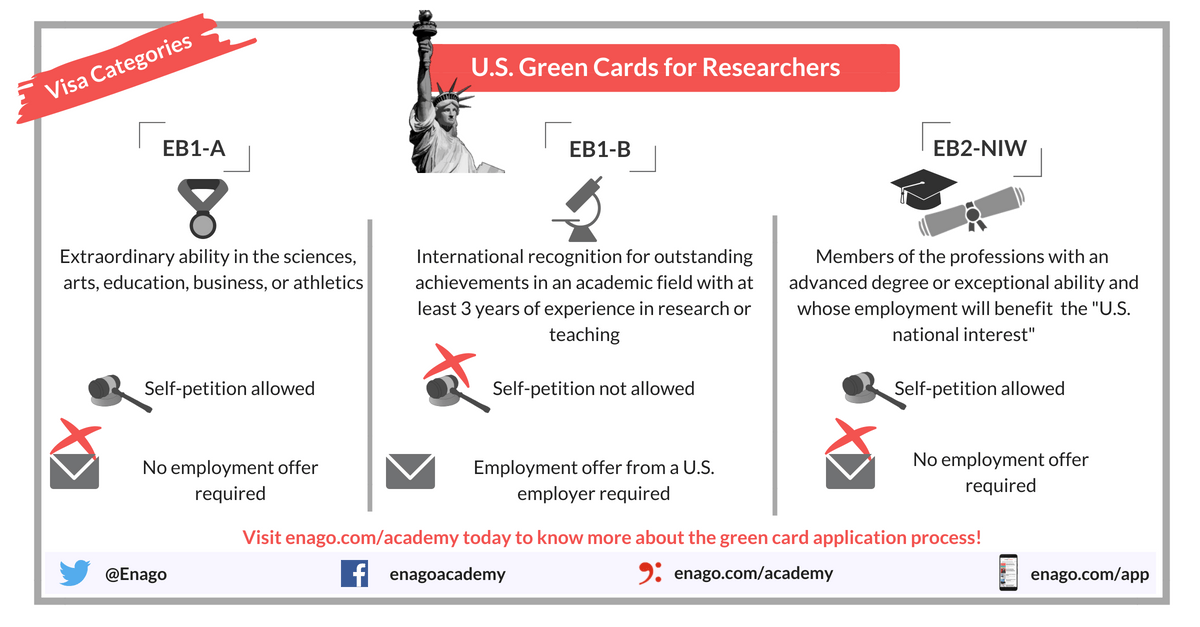U.S. Green Card Tips for Researchers

According to the US Citizenship and Immigration Services (USCIS), there are various categories for employment-based green cards. Researchers and professors can choose from EB-1A, EB-1B, and EB2-NIW depending on the different eligibility criteria. Ideally, these categories are preferential depending on the exceptional qualities of the scholar. The EB first preference (EB-1A) is a visa for foreign nationals who possess extraordinary abilities in a particular scholarly field or sciences, arts, education, business, or athletics. It could also apply to multinational executives. The EB-1A is a self-petitioned visa that is extremely restrictive.
Understanding the EB-1 Classification
The EB-1B is a visa classification that is awarded to an internationally recognized foreign national. Both, residents and non-residents of the United States qualify for this visa classification. Unlike the EB-1A, this is an employer-sponsored visa. The employer, in this case, must demonstrate that the concerned person has extraordinary abilities in his/her respective field and has a permanent job offer from the employer. Presently the USCIS stipulates three critical requirements that the scholars must satisfy for consideration.
- The researcher ought to have international recognition and outstanding achievements in his or her area of specialization.
- He/she should have at least three years of relevant experience to qualify.
- Finally, he/she should have a job offer for a permanent position (may change under few conditions).
Green Card Based on National Interest Waiver (EB2-NIW)
For most applicants in this category, it is necessary to have a permanent job offer and an approved labor certification. Nevertheless, NIW allows these requirements to be waived. As a result, a researcher can apply without a labor certification or employment offer from U.S employers. However, filling out this particular waiver requires an applicant to have either an advanced degree or outstanding ability in a scholarly field. Additionally, the scholars must be persuasively convincing that their achievements will hold national importance. It would demonstrate the necessity to waive requirements.

Useful Tips for Applying in Different Categories
It is not always simple for a researcher or a professor to succeed in applying to the different categories of employment-based green cards. Here are some tips to help well-meaning professionals streamline the process. Whether a researcher is a foreign national living abroad or based in the United States, these tips can help make a seemingly complicated process a little less stressful:
- Write a thorough and persuasive academic achievement document indicating whether you are a Masters or a PhD degree holder.
- Apply promptly. Make sure to keep documents ready and apply as soon the application window has opened.
- Provide clear attachments of your publications in reputed journals, demonstrating your contribution in the area of specialization.
- Have an option to hire an attorney to help you guide through the legal affairs concerning the application. However, the solicitor will likely charge a fee depending on the services required. You can also check whether do-it-yourself (DIY) packages can support you through this process.
- Consult widely with the employer tabling the job offer for proper representation. It is especially essential in the case of EB-1B.
- Correctly fill in form I-140.

After the Process is Complete
After you submit your application, the USCIS will review the application and schedule interviews with the shortlisted candidates. Furthermore, in some instances, like the EB-1B application, you have to get a willing U.S employer to sponsor you for the visa. Additionally, the employer will also be required to file labor certifications. After completing this process with positive results, the researcher can immigrate to the United States and start a new life as they continue with their academic achievements and contributions. During the application process, some procedures are in line with national interests of the U.S. For best results, it is advantageous to adhere to these procedures throughout the entire application process.
Have you considered applying or have already applied for the discussed visa categories? We would love to know your experience and tips. Share your thoughts in the comments section below!










Thanks for explaining how there are various application categories for green cards that each require different eligibility criteria and the one that is chosen depends on the scholar’s qualities. When choosing one, you might want to make sure you know the requirements so you can figure out which one best fits you and your situation. While you do this, it might help to work with a professional that specializes in green card services so you can discuss your situation and get answers to your questions in order to make sure you choose the right one and fill out everything correctly.